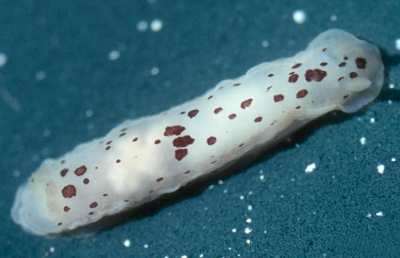
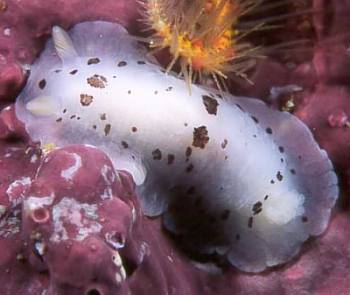
Dendrodoris behrensi
Millen & Bertsch, 2005
Order: NUDIBRANCHIA
Suborder: DORIDINA
Superfamily: EUDORIDOIDEA
Family: Dendrodorididae
DISTRIBUTION
Known from Monterey Bay, California, USA to San Benitos Islands, Baja California, Mexico.
PHOTO
Upper: Bahia Falsa, San Quintin, Baja California, Mexico, Pacific Ocean. : Intertidal. Length: 22 mm. 27 May 2001. Oyster reef. Photographer: Jeff Goddard. Lower: California. Photo: Bruce Wight.
This species was previously known on the Forum as Dendrodoris sp. 4. The body is elongate with a narrow undulating mantle skirt. The mantle is smooth, and there are 3-6 bipinnate or sparsely tripinnate gills. Arranged in a circle around the anus which is situated near the posterior end of the body. The ground colour is semi translucent white or cream with scattered brown spots of varying size on the mantle. The number and position of the spots can vary but they are normally clustered in 4 regions on the mantle - in front of and behind the gills, midway between the gills and the rhinophores and just in fromt of the gills. There can also be small spots scattered in a submarginal band around the mantle skirt. The gills and rhinophores are white and sometimes there are a few spots near the tips of the gills. There may also be a few small brown spots on the side of the body and the dorsal surface of the posterior foot. It has ametamorphic direct development and grows to at least 20 mm in length.
This species belongs to a group, including Dendrodoris elongata, with a body capable of great elongation, narrow mantle skirt, and anus very near the posterior tip of the body
-
Millen, S.V. and Bertsch, H. (2005) Two new species of porostome nudibranchs (family Dendrodorididae) from the coasts of California (USA) and Baja California (Mexico). Proceedings of the California Academy of Sciences, 56(18):189-199.
-
Goddard, J.H.R. (2005) Ametamorphic direct development in Dendrodoris behrensi (Nudibranchia: Dendrodorididae), with a review of developmental mode in the family. Proceedings of the California Academy of Sciences, 56(19): 201-211.
Rudman, W.B., 2005 (September 23) Dendrodoris behrensi Millen & Bertsch, 2005. [In] Sea Slug Forum. Australian Museum, Sydney. Available from http://www.seaslugforum.net/find/dendbehr
Related messages
First Dendrodoris behrensi in Los Angeles?
January 18, 2007
From: Scott Gietler
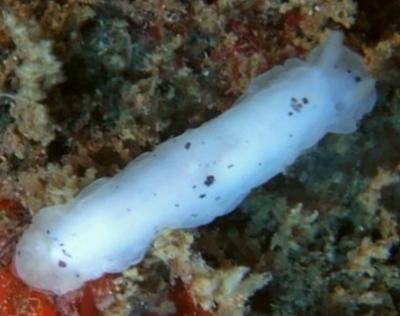
This is the first instance that I know of, of a Dendrodoris behrensi being found in Los Angeles county, not counting the channel islands.
Marineland has produced at least 30 species of nudibranchs, and it never disappoints. Jen Tople found this nudie on a dive yesterday, and several of us quickly photographed it.
It was quite small, and we weren't sure what it was until we looked at the photographs later. It was crawling up a rocky pinnacle at 30 ft depth.
Locality: Marineland, Palos Verdes, 30 feet, CA, USA, Pacific Ocean, 8 January 2007, on the wall of a rocky pinnacle. Length: 1 inch. Photographer: Scott Gietler.
Scott
sgietler@yahoo.com
Gietler, Scott, 2007 (Jan 18) First Dendrodoris behrensi in Los Angeles?. [Message in] Sea Slug Forum. Australian Museum, Sydney. Available from http://www.seaslugforum.net/find/19202Hi scott,
Wow so much chatter about this species lately. Fantastic. It had gone unnoticed for so long, and know with a little PR, lots of folks are finding it. Those of you who are interested should go to Mike Miller's Slug Site for this weeks Branch of the Week (BOW) to learn a little about this species larval development and see some really great microscopic photos of developing eggs, embryos and juveniles, taken by Jeff Goddard.
Over the years, several of us have collected many specimens all up and down the southern California coast. Presently this species has been documented from Carmel, Monterey County, California to the north all the way south to Islas Guadalupe and San Benitos, Baja California, Mexico. Although occurring subtidally, like your photo here, it is also found in the intertidal in rubble.
Best wishes,
Dave Behrens
Dendrodoris behrensi from California and Mexico
September 26, 2005
From: Jeff Goddard
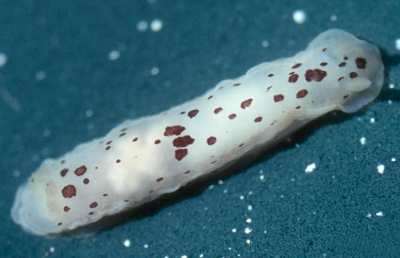
Hi Bill,
After much anticipation, Dendrodoris sp. 4 of the Sea Slug Forum has finally been described by Sandra Millen and Hans Bertsch as Dendrodoris behrensi, named, of course, after Dave Behrens. I have included an image of a specimen from Bahia Falsa, near San Quintin in northern Baja California.
Locality: Bahia Falsa, San Quintin, Baja California, Mexico. Pacific Ocean. Intertidal. Length: 22 mm. 27 May 2001. Oyster reef. Photographer: Jeff Goddard
In a companion paper, I briefly describe ametamorphic direct development in Dendrodoris behrensi and review what is known about mode of development in the family Dendrodorididae.
-
Millen, S.V. and Bertsch, H. (2005) Two new species of porostome nudibranchs (family Dendrodorididae) from the coasts of California (USA) and Baja California (Mexico). Proceedings of the California Academy of Sciences, 56(18):189-199.
-
Goddard, J.H.R. (2005) Ametamorphic direct development in Dendrodoris behrensi (Nudibranchia: Dendrodorididae), with a review of developmental mode in the family. Proceedings of the California Academy of Sciences, 56(19): 201-211.
Best wishes,
Jeff
goddard@lifesci.ucsb.edu
Jeffrey H.R. Goddard, 2005 (Sep 26) Dendrodoris behrensi from California and Mexico. [Message in] Sea Slug Forum. Australian Museum, Sydney. Available from http://www.seaslugforum.net/find/14826Thanks Jeff,
This animal reminds me very much of Dendrodoris elongata, with its long body, narrow mantle skirt, and anus very near the posterior tip of the body. I hope someone is able to provide me with a photo of Dendrodoris stohleri, the other species from California, described in that paper .
Best wishes,
Bill Rudman
Dendrodoris sp. 4 from California
December 29, 2004
From: Sean Kearney
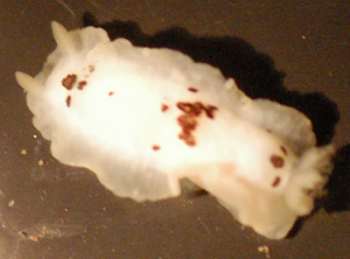
Note added 23 Sept 2005: Dendrodoris sp. 4 has been named D. behrensi.
Dear Bill..
On May 2nd of this year I was diving in San Diego, California and came across this little guy. I was at the end of the dive and just starting to ascend when it caught my eye. My strobe was off, my light was going low and I had to go up. I did recognize it as the animal on the back cover of Dave Behrens' book so I collected it. It is in a formalin solution and I am waiting to hear from Hans or Dave. I thought that you might like another shot of it.
Locality: Horsehead Reef, San Diego, California, USA.
Depth: 47 feet, Length: 12mm. 2 May 2004
Photographer: Sean Kearney
Thanks for your great Forum.
Sean Kearney
skearney@dc.rr.com
Kearney, S., 2004 (Dec 29) Dendrodoris sp. 4 from California. [Message in] Sea Slug Forum. Australian Museum, Sydney. Available from http://www.seaslugforum.net/find/12842Dear Sean,
I am sure any information on this species will be welcome to those working on it
Best wishes,
Bill Rudman
Ken Ashman's Dendrodoris
April 18, 2003
From: Bruce Wight


Note added 23 Sept 2005: Dendrodoris sp. 4 has been named D. behrensi.
Doc,
Ken's branch is not a Diaulula and is a Dendrodoris sp. I do not think it is named. They are not as round as the Diaulula and the skin is smooth, the blotches are purple-brown and are very random in location and size. Almost all the ones I have seen are on encrusting purple coralline. It is a nice find for these branchs are fairly uncommon. I have seen them only a handful of times at three locations in California; Laguna Beach, Santa Barbara Island and San Miguel Island. Enclosed are a couple specimens I have caught on film.
Take care,
Bruce Wight
bwproductions@earthlink.net
Wight, B., 2003 (Apr 18) Ken Ashman's Dendrodoris. [Message in] Sea Slug Forum. Australian Museum, Sydney. Available from http://www.seaslugforum.net/find/9711Thanks Bruce,
Your records are a nice addition to the story. I suspect you'll be receiving an email from Sandra for more details.
Best wishes,
Bill Rudman
More on Diaulula sandiegensis? from California
April 17, 2003
From: Ken Ashman
Note added 23 Sept 2005: Dendrodoris sp. 4 has been named D. behrensi.
Concerning my mystery dorid from California. I've been in contact with Sandra Millen of British Columbia University. She has been doing work on the slug in question, and said after looking at the photo that "the elongate shape, small mantle margin, posterior gill placement and trailing tail look a lot more like Dendrodoris #3 to me than a Dialaula sandiegensis." Hans Bertsch is working with Millen to name the animal, and suspects the same.
I understand this is the first Anacapa Island find for the slug. I am very happy to have even a tiny part in the work you are doing. The mystery of species identification is a significant piece of what draws me to u/w photography. I very much admire the work you all are doing.
Ken Ashman
California Digital Diving
kenashman@scubadiving.com
Dear Ken,
From the copies of emails I received last night from Hans Bertsch, Sandra Millen and Dave Behrens, your photo caused an immediate excitement. I agree that the points Sandra raises certainly suggest a Dendrodoris. In future it looks as though you may need to take a closer look at dark spotted dorids in the field to be sure of their identity. I have moved you animal to a temporary Dendrodoris sp. 4 Page.
Best wishes,
Bill Rudman
Diaulula sandiegensis? from California
April 16, 2003
From: Ken Ashman
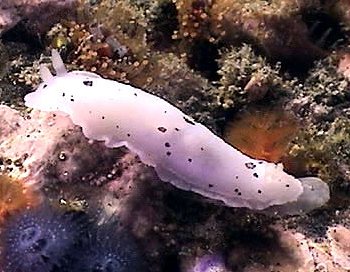
Note added 23 Sept 2005: Dendrodoris sp. 4 has been named D. behrensi.
I found this at Anacapa Island, California (northern Channel Islands) at 25 ft. It's size was about 2" x 1/2".
Items I noted: the doughnut patterns don't seem right for Diaulula sandiegensis, nor do the rhinophores seem right. To me - based on the three groups of speckles and overall appearance - it might be Dendrodoris sp. 3. Does it have this color variation?
Ken Ashman
kenashman@scubadiving.com
Ashman, K., 2003 (Apr 16) Diaulula sandiegensis? from California. [Message in] Sea Slug Forum. Australian Museum, Sydney. Available from http://www.seaslugforum.net/find/9510Dear Ken,
If you look through the Forum messages, Diaulula sandiegensis the black markings on the mantle are quite variable. In fact photos from British Columbia with a quite irregular arrangement of 'doughnuts' and spots fit your animal quite well.
Concerning your Dendrodoris sp. 3. I suspect your talking about the animal in Dave Behren's book. It is quite a different animal than the one on the Forum I have labelled Dendrodoris sp. 3. I suppose your animal could be Dave Behrens' Dendrodoris sp. 3. I think the only way to be sure would be to know more about the animal. One simple difference is that species of Dendrodoris have a smooth fleshy back while the back of Diaulula has a covering of bristly caryophyllidia.
Best wishes,
Bill Rudman
